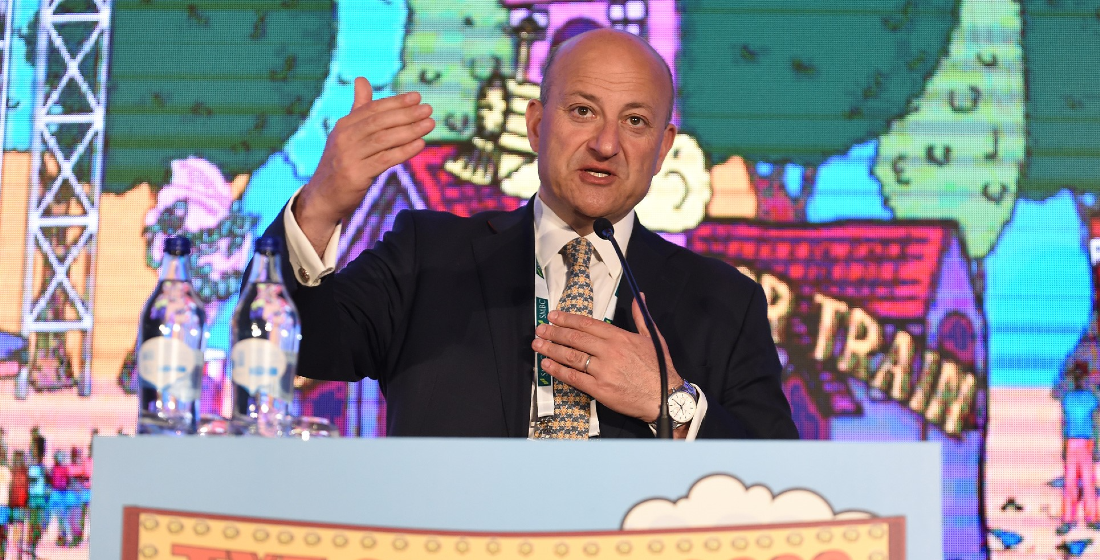UKEF raises the bar with clear focus on sustainability
In an exclusive interview with UK Export Finance CEO, Louis Taylor, he reveals how the UK agency has not only pushed the sustainability frontier further than many other agencies, but will also now introduce reporting on project emissions.

For some time now sustainability has been the ‘buzz’ word within the export finance sector. And every export credit agency (ECA) has their own way of facing up to the sustainability challenge while also supporting their particular country’s exporting base. For some agencies it would appear to be more of a challenge than others. But back in December 2020 the UK government announced that they would stop financing new fossil fuel projects overseas – a policy which has been implemented since March 2021.
As a government agency, UK Export Finance (UKEF) has naturally had to apply this policy to its operations. But at the same time, UKEF, under the direction of CEO Louis Taylor for the last seven years, has become one of the most progressive ECAs globally and has also cleverly focused on sustainability across the whole industrial base.
Sustainability and TXF Data
Some three years ago TXF Data began recording sustainable ECA-backed deals using a specific methodology developed in conjunction with Acre Impact Capital. This has further evolved since that launch. Last year, UKEF came out on top within TXF Data as the ECA which has provided the most financing for sustainable deals, with the agency ramping up considerably from the year before. In 2021 UKEF provided £3.6 billion ($4.4 billion) for sustainable projects. This was out of a total of $10.596 billion provided by UKEF for all deals including covid-related transactions during 2021, according to TXF Data.
Commenting on the landmark work that TXF has done recording ECA-backed sustainable deals, Taylor says: “I think it’s really important the work that TXF has done in collecting data on the deals that have been done. I really care about the ‘colour’ of the projects, and what you are doing with your data highlighting the deals which are sustainable. I almost don’t care about the colour of the money – I care about the projects!”
And with reference to the increasing cooperation taking place across ECA-backed transactions, he notes: “It’s not so much where the money is sourced from, it’s whether the deals are sustainable or not – and that’s the important thing, as we drive towards net-zero. So, I am really pleased that we have managed to move up from the number two spot to this year’s number one spot, and with a 50% increase in sustainable deals.”
Evaluating and defining sustainable transactions is something that TXF Data continues to work on with the export finance community. That said, there is still much work to be done by the overall community on how deals are defined so that greater transparency can be brought into play.
As Taylor points out: “Of course, it is a case of how you define those sustainable deals and we have seen the rigour of the data analysis that TXF has done. In truth we have suggested that some deals could come out rather than go in and we would still come out number one. I think it is really important that deals are genuinely sustainable, so we don’t have the equivalent of greenwashing. I think this is an informative time where there still isn’t a lot of consensus around the measurement of the sustainability metrics, and as such the industry needs to do a much better job on the definition of that.”
He also adds: “Another thing to say in relation to sustainability is that we have introduced the word sustainable into our mission statement. But it’s not about simply taking a moral stand, it’s about doing business sustainably. What has just been announced by TXF in terms of data analysis and the transactions we’ve done is a demonstration of returning sustainability to business and not simply taking a moral position.”
Quantifying emissions – a blueprint for other ECAs?
Pushing the equation further, UKEF is also getting to grips with how the agency evaluates its own emissions in the course of its project activity.
“One of the things that I am proud of, which is in our annual report is that UKEF is making its second climate disclosure, and this time it is a lot more quantitative than last time which was then purely qualitative” explains Taylor. “We’ve introduced a methodology which we think will be quite important for ECAs who predominantly do guarantees rather than actually providing the actual finance themselves.
“We are going to reveal the emissions on our portfolio as if we had financed them – so, if we had financed 20% of a project it is those emissions we will show. But if we had done the project through a guarantee we are going to look at it on a slightly different basis attributable to a guarantor on the basis of expected loss rather than the full attribution. It’s not that we are hiding anything, we will put the full attribution number out there, but the impact we’re having is likely to be better reflected with this methodology. So, we are really moving forward.”
In the recently released annual statement UKEF stated that it had set new targets to reduce absolute emissions (tCO2e) of oil and gas sector exposure by 75% by 2030 and reduce economic emissions intensity (tCO2e/£AAR) of power sector exposure by 58% by 2030 as it seeks to operate on a net-zero basis by 2050.
Few agencies have raised the bar on this matter to date, and it is possible that some other ECAs may decide to take a closer look at this methodology. Does Taylor think that this is feasible and practical?
He responds: “We would really love it to be picked up by other ECAs. It’s not as though we’ve just developed it ourselves; we’ve been working with PwC on this. It just doesn’t seem right that a guarantor would recognise the same emissions as the actual provider of the finance, who is the beneficiary of the guarantee. But we have to find some way to attach our responsibility for projects – so that expected loss measurement we feel is an appropriate way to go. Others may come up with different methods of course. But we would like to see the whole space coalescing around a set of standards that means there is greater comparability and transparency in terms of what others are doing.”
The push to standardisation
Across the spectrum of international trade and export financing, although a lot has been done in terms of the standardisation of sustainability much more still needs to be done on the terminology being used.
As Taylor points out: “The standardisation isn’t there currently, although there is a proliferation of taxonomy. But rather than having a huge theological debate about this kind of thing we should rather zero in on pragmatism.
“You can look at something and you largely know whether it has sustainable credentials or not. At the same time, it’s not simply a question of eyeballing things, which is why we would like to see a coalescing around standards. And that should be more possible than the debate currently seems to suggest.”
And in terms of third-party verification on individual transactions, Taylor is adamant that transparency is the over-riding factor. “Look, I think it’s always a good thing when a deal has third party verification on the sustainable front. Usually on an IFC deal for instance, where there are their own environmental standards, there are also third-party endorsements there anyway. But I think whatever methodology we use we should be transparent about that methodology,” he stresses.
UKEF TXF Deals of the Year successes through 2021
Looking at the intensity of the push that UKEF has made over the past couple of years, the agency has delivered on some spectacular deals. In the TXF Export Finance Deals of the Year for calendar year 2021, UKEF won three out of the overall ‘Perfect 10’ transactions – more so than any other ECA. The deals were: the Healthcare Export Finance Deal of the Year - NMS Hospital Project Cote d’Ivoire; the Renewables Export Finance Deal of the Year - Changhua 1 & 2a Offshore Wind; and, the Rail Transport Export Finance Deal of the Year - Ankara-Izmir High-Speed Railway. Full details of these transactions can be found here: https://www.txfnews.com/articles/7400/Revving-it-up-TXF-Export-Finance-Deals-of-the-Year
Commenting on these awards, Taylor is keen to not only point out the social and sustainable characteristics of these landmark transactions, but also the developmental importance of such deals to these countries and regions.
“These three awards are all for fantastic deals. The NMSI Infrastructure deal in Cote d’Ivoire, which won the TXF Healthcare Deal of the Year, really is the social deal of the year for me. This brilliant deal, where NMSI will look to build six hospitals in the country, we are really proud of. But it’s one of several countries in Africa where we are building hospitals. And actually, the developmental and social aspects of all of this are huge. And perhaps we don’t signal those enough!
“Because, whilst we don’t have a mandate which is limited by developmental requirements, so much of what we do is positively developmental. And, if we do it in a responsible way, it is sustainable as well. So, we are delighted with the NMSI deal as TXF Healthcare Deal of the Year.”
The global spread of UKEF’s successes are amplified with the other two 2021 award winning deals – in Taiwan and Turkey respectively. He adds: “We are also delighted with the Changhua offshore wind deal in Taiwan winning the TXF Renewables Deal of the Year. And, of course, we are thrilled with the Ankara-Izmir High-Speed Railway deal being awarded the TXF Rail Transport Deal of the Year. And all of these are excellent examples of sustainable deals.”
And the scale of these transactions demonstrates that UKEF is determined not to be outgunned or put off by overall scale of the project. With regards to the Turkish rail deal he explains how working with other ECAs was vital in terms of reinsurance and reducing the risk to the UK taxpayer. “On the Ankara-Izmir HSR deal we put up €2.2 billion ($2.24 billion) gross. We worked with some of our colleagues in other ECAs and part of the deal was reinsured. This is the biggest deal we done to date in the infrastructure space. And it comes hot on the heels of the two monorail deals we did in Cairo the year before. So, it really is great news for UK exports and industry.”
The bigger picture, a new focus and breaking into new markets
Rightly so, Taylor is keen to stress just how important the new vision of UKEF is and how it encourages working with new exporters/companies and exploring new sectors and territories.
“The fact that we are no longer looking at fossil fuel deals allows us so much more time to now focus on the deals we should be paying attention to,” he relays. “So rather than worrying or fretting over how to get a fossil fuel deal done responsibly we are focused on these sustainable deals. Last year, UKEF underwrote £7.8 billion ($9.56 billion) of transactions without a single penny going into fossil fuels. And that volume is the second largest ever. This is a real pivot from the years before.”
According to the recently released UKEF annual statement for 2021-22 this funding supported UK exports to 61 countries in 2021-22, without any for overseas fossil fuel projects. It also supported up to 72,000 UK jobs and added a gross value add of £4.3 billion to the economy. Of the UK companies supported by UKEF, 81% were small and medium-sized enterprises, according to the annual report.
Flexibility has been the key for much of the success that UKEF has seen in recent years, and this flexibility has all been done within the confines of the outdated OECD Consensus. “The breadth of the UK supply chain is allowing us to develop these deals, plus the flexibility of UKEF itself because we only require a minimum of 20% UK content relative to our financing – even though we manage a lot more than that. But that flexibility has allowed us to be in these transactions,” says Taylor.
Expanding on the range of transactions and markets, he details: “There are many stand-out transactions beyond the award-winning deals of course. Whether its solar power and water pumps in Ghana and Uganda – providing clean drinking water for less than half a cent per day to quarter of a million people in each country – or whether its flat-packed bridges that help farmers get their products to market. These are great projects and game-changers. We’ve been active recently in Benin and Togo for example – so we are also opening up a lot of new markets in West Africa in particular, and with more to come.”
One of the innovations that UKEF also put in place to boost its access to target markets has been the introduction of regional representatives on the ground in key regional markets. At various TXF events over the last few years, I have personally seen what a boost this brings to the UK offering. Does the man at the helm believe this has also made a good impact?
Taylor responds: “Yes, you’re absolutely right, our overseas network has made a big difference. Some of the success of these deals can certainly be put down to UKEF regional representatives exploring for deals. Steve Gray, our man in Accra for instance, was recently awarded an OBE for his services. He has been instrumental in opening up certain markets in West Africa.
“We also have colleagues elsewhere, but it’s quite a small network, and won’t get bigger than 30. They are there to augment the Department for International Business & Trade by having specific conversations with the right parties. And if we go as UKEF, and can help underwrite some of that content, then it is a very different conversation. This small team has been quite dynamic in building such business.
“Overall, it’s a turbo-charged lean and mean team. They are local hires for a local market and they know what is right and what is not. That’s a very specialised resource. Having that local interaction makes a big difference.”
The need for change with the OECD Arrangement
As already noted, UKEF has managed to find tremendous success despite the limitations and constraints of the OECD Consensus, also known as the Arrangement. So, does Taylor feel that something needs to be done now, and where does he think those changes should begin? “Yes, I firmly believe that changes are necessary to the OECD Arrangement. Fortunately, now there is a bit of a head of steam building up with a group of the participants within the export finance sector to really push for some significant reform of the Arrangement now.
“I think the clean growth sector understanding is really the vehicle we would like to see augmented firstly with a broadening out of the technologies. Secondly, allowing more flexibility around tenor and particularly suppressing the yield curve out of that long end in order to make pricing manageable rather than prohibitive. The justification is that the private market is providing this so why shouldn’t the ECAs? It’s not as though they are providing it on every deal – but reform is needed.”
He further details: “If you look at the Dogger Bank deal [UK offshore wind farm] for instance, there is a 30-year financing within that, so why can’t ECAs provide 30-year financing on transactions where they are comfortable, they are going to get their money back. It feels to me as though there is a straightjacket which is inhibiting the ECAs from performing a role they should be doing in driving sustainable growth.”
And the whole area of social and sustainable deals is an area that most within the export finance community think the OECD needs to pay much more immediate attention to as there is currently little common sense applied across such sectors. Many would like to see tenors increased and/or premiums reduced for social deals in emerging markets for example. What does Taylor think about sectors such as electricity transmission and distribution where there is generally a limit of 12-year tenors, for example?
He concludes: “Yes - this is a great example of the inconsistencies of the Arrangement, but it is also very pertinent. With all the talk of renewable energy, what isn’t spoken about enough is the investment which is going to be needed in all parts of the grid. Because with renewable energy, it isn’t all about the base load. So there needs to be changes made to the rules on grid/transmission and distribution projects. And this is an area where we feel we could spend a lot of time on as UKEF.”
Footnote: Louis Taylor is to be the new CEO of British Business Bank, from his role as CEO of UKEF. His role will begin on 1 October. British Business Bank is the UK’s economic development bank. Taylor has been at UKEF since 2015. Taylor replaces Catherine Lewis La Torre, the interim CEO of British Business Bank since its setup. Taylor’s replacement at UKEF has not yet been announced, but Taylor tells TXF UKEF is launching an open process to recruit a successor.





